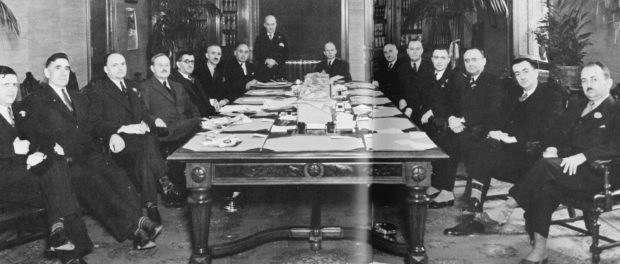1944: The End of Godbout & Other Quebec Curios
Part of “Shadows and Revolution”, 1900-1960
 The Godbout cabinet, 1939. Godbout's second term as Premier of Québec and final win against the political giant Duplessis.
The Godbout cabinet, 1939. Godbout's second term as Premier of Québec and final win against the political giant Duplessis.
The 1944 election saw old and new brought together. The first provincial election in which women could vote and where there were not only one but two new political parties that won seats, the election also saw the old rivalry of Maurice Duplessis and Adélard Godbout. With Godbout’s advances in mandatory elementary school education, the Premier that granted the women’s vote, and his creation of Hydro-Québec, an early attempt at nationalizing hydroelectricity, it might seem to modern eyes that Godbout would be slated for re-election. However, this was not to be the case.
As with any election, dirty tricks were played. One particularly dirty trick came from Maurice Duplessis’ election team, who accused Godbout of taking money from Jewish immigrants in order to get elected. His team circulated a cartoon, in which an International Zionist Brotherhood, featuring an anti-Semitic depiction of Jews, gave money to Godbout’s election team. Duplessis promised that he reverse Godbout’s decision to bring in 100 000 Jewish refugees despite the fact that Godbout did not promise to do any such thing.
In addition to the anti-Semitism of the time, Godbout’s political coffin seemed sealed by one thing: conscription. Despite his social progresses, Godbout not only had the Church against most of his measures, he also was the Premier that was in the middle of the second conscription crisis, eventually siding with the federal Prime Minister, William Lyon Mackenzie King. Duplessis, once again using this perception to his advantage, painted Godbout as a weak lackey, a slave to the federal government. Duplessis’ stories rang true for the French-Canadian population, many of who wished for a stronger autonomous provincial government (or at least did not trust the federal government) and who had fears and prejudices against the unknown Others of society. Duplessis’ tactics worked, and he was re-elected with a majority of forty-eight seats. Godbout’s Liberals, however, were decimated, winning only thirty seven seats (losing almost half of the seats they had won in the previous election).
Aside from the Conservatives and the Liberals, two political parties became minor players in the Québec provincial elections. The Bloc populaire, headed by André Laurendeau, had a platform that opposed conscription. A young Jean Drapeau and Pierre Elliot Trudeau were among supporters, and won four seats. The other party, the Fédération du Commonwealth Coopératif, was a precursor of the provincial New Democratic Party, won initially two seats, but one of the people elected decided to sit as an independent afterwards.
Godbout would remain Leader of the Opposition through to the next provincial election in 1948, but he would never hold the office of Premier again. Prime Minister Louis St-Laurent would appoint him to the Senate in 1949. Though he would not live to see his social progress furthered, dying in 1956, his legacy was continued through the next generation of politicians. Most notably, his idea of nationalizing hydroelectricity came to fruition during the time of Jean Lesage and the Quiet Revolution. Godbout’s legacy continues to be experienced today, with each woman’s vote, with each child in elementary school, with each person that passes by the Université de Montréal.
For one last look at Adélard Godbout, check out Jacques Godbout’s documentary, Traître ou Patroite (Traitor or Patriot) here. Jacques Godbout is Adélard Godbout’s grand-nephew.





